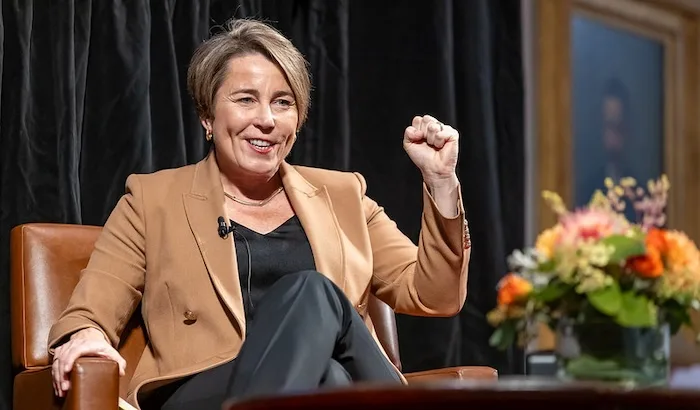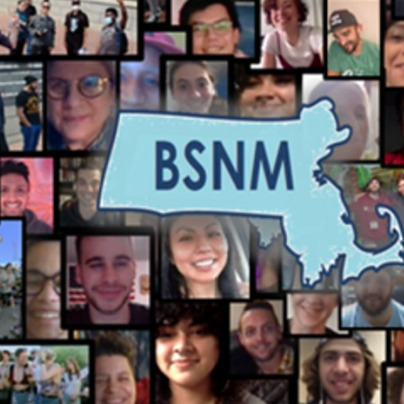
As advocates call for legalization, HERO Act would study benefits for veterans
Ed. Note: While Talking Joints Memo is focused on cannabis culture and products, we also see that psychedelics are the next theater in the war to end the War on Drugs. The movement is very much underway already, as the volunteer network Bay Staters for Natural Medicine (BSNM) has successfully pushed efforts to decriminalize psychedelic plants in Somerville, Cambridge, Easthampton, Northampton, and Salem, with various similar efforts underway elsewhere. BSNM currently has multiple pieces of legislation filed in the Massachusetts legislature, and to help walk readers through them we asked the group’s board to provide op-eds and updates. This is the most recent post outlining their efforts on Beacon Hill.
The Commonwealth of Massachusetts has emerged as a nationwide leader in reforms advancing access to psilocybin mushrooms, and its governor is beginning to take notice.
Gov. Maura Healey filed legislation on Veterans Day to increase benefits, modernize services, and promote inclusivity for Massachusetts veterans called An Act Honoring, Empowering and Recognizing Our Service members and Veterans (HERO Act). Among priorities such as reimbursement for LGBTQ service members and expanding behavioral health treatment, the bill would also create a “public-private working group to study the health benefits of psychedelics as treatment for veterans suffering from physical or mental health disorders related to their service.”
Long before the governor’s new bill, there was robust discussion in the Massachusetts legislature around legalizing psychedelic facilitation and allowing residents to grow and share psilocybin mushrooms. Bay Staters for Natural Medicine and New England Veterans for Plant Medicine are two of dozens of groups who have endorsed these bills. The coalition is now working to change a Massachusetts ballot measure proposed by the DC-based New Approaches PAC, which legalized psilocybin in Oregon in a way that experts characterize as restrictive and unaffordable.
“Thank you, Governor Healey, for recognizing the importance of psilocybin,” said James Davis, the cofounder of Bay Staters for Natural Medicine and former staffer to the state’s Joint Committee on Cannabis Policy. “We need to substitute the proposed ballot measure with the legislation filed by Sen. Jehlen, Rep. Sabadosa, and Rep. Boldyga so that veterans are not charged $4,000 or more for psychedelic treatments like they are in Oregon.”
Michael Botelho, US Marine Corp Veteran and Co-Founder of New England Veterans for Plant Medicine, added, “We need to change the Massachusetts ballot measure being pushed by ‘New Approaches’ PAC. These corrupt actors were responsible for the broken way we legalized cannabis and created a system in Oregon where it is virtually impossible for ordinary vets like myself to afford plant medicine treatments. We want to earn the governor’s support.”
In addition to the Massachusetts cities of Somerville, Cambridge, Northampton, Easthampton, Amherst, and Salem passing measures that order their respective police departments to no longer enforce laws against sharing and growing psilocybin, a veteran-specific measure was passed in 2022. Massachusetts’s second largest city passed a measure that recognized “60 Massachusetts veterans take their own lives by suicide every year,” while a 2020 meta-analysis of randomized clinical trials dating back two decades found that psychedelic plant-assisted counseling is “highly effective in treating PTSD, depression, anxiety.”
The largest longitudinal study ever done on psilocybin use with a sample size of nearly 8,000 people recently found that “outside of clinical research settings, psilocybin is capable of producing significant and persisting changes in psychological health and wellbeing, such as reductions in anxiety, depression and alcohol misuse.” This demonstrates that, with or without the governor’s bill to create a new study, there exists robust evidence of psilocybin’s benefits for many who chose to use it.
Ellen Brown, an Air Force Veteran and Massachusetts cannabis advocate, thanked the governor and called for action on pending legislation as well, stating, “the governor and House speaker need to change the ballot question to avoid corporate takeover and regulation to the point of system insolvency. The ballot measure’s framework would create the same barriers to entry that have held back cannabis access for our Veterans. These treatments need to be legalized affordably.”
Massachusetts advocacy groups have indeed been sounding the alarm about a potential ballot question that would create an unelected five-person control commission to write rules for facilitation services by the year 2028. Among other concerns, advocates point to Oregon, where the price of facilitation services has ballooned to over $4,000 in many instances and many small entrepreneurs are struggling to provide affordable services. Some compared these costs to the rollout of ketamine, which remains unaffordable to many.
“As the wife of a veteran with PTSD, I am grateful that Governor Healey sees the value in psychedelic treatments,” said Jamie Morey, the founder of Massachusetts-based Parents for Plant Medicine. “Yet we must fight to keep services affordable and avoid what has happened with ketamine, which is completely inaccessible to many who could benefit due to cost.”

























